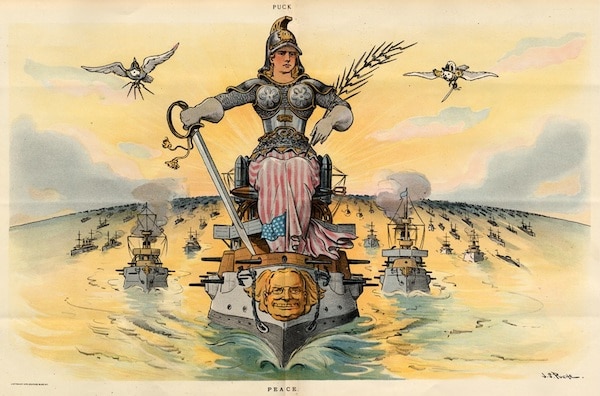Why are so many modern capitalist societies addicted to militarism? The theory of monopoly capitalism claims that addiction to militarism is no accident. It flows from deep structural properties of monopoly capitalist societies. The theory of monopoly capitalism has been developed and revised by Marxist scholars including Michal Kalecki, Paul Baran, Paul Sweezy, Harry Magdoff, Samir Amin and John Bellamy Foster. The theory received its first systematic exposition in Baran and Sweezy’s famous book Monopoly Capital (1966).
A monopoly capitalist society is one whose economy is comprehensively dominated by giant corporations. Each major industry has an oligopolistic structure. That is, each major industry is ruled by a few giant corporations who control the price structure, investment patterns, labor relations, and every other aspect of the industry. In particular, the corporations abolish meaningful price competition and establish a uniform price configuration that yields maximum profits. The theory contends that the social and economic dynamics of monopoly capitalist societies differ greatly from those of competitive capitalist societies not dominated by huge corporations.
The concept of economic surplus is central to the theory of monopoly capitalism. Economic surplus is the difference between the total price of society’s economic product and the cost of producing that product. Economic surplus tends to increase within monopoly capitalist societies. This happens because corporations control prices and because they appropriate virtually all technological gains in productivity. But rising economic surplus creates serious systemic problems. The surplus must be used in an economically rational manner because unused surplus causes unemployment, profit decline, debt default and other dangerous economic malfunctions. Unfortunately, the capacity of monopoly capitalist economies to absorb economic surplus does not match their ability to create it. Due to endemic unabsorbed surplus, the normal condition of monopoly capitalism is economic stagnation: substantial unemployment, weak investment, unused production capacity, high indebtedness, etc.
This is where militarism enters the picture. Militarism has two interrelated roots within monopoly capitalist societies. On the one hand, these societies are intensely growth oriented and expansionist. Militarism is required to make the world safe for capitalist expansion and to crush anti-capitalist movements induced by the manifold capitalist inequities. On the other hand, militarism is a convenient way of absorbing economic surplus and thereby countering the stagnationist propensity of monopoly capitalism. Militarism is a convenient surplus absorption method because (a) its magnitude is unlimited, (b) it does not interfere with capitalist profit making, and (c) it is easily supported by the corporate-controlled mass media.
Numerous statistics indicate the importance of militarism within the monopoly capitalist economy of the United States. For many years, about half of discretionary federal spending has been for military purposes, which typically accounts for over 7 percent of the U.S. gross domestic product. Well-intentioned peace activists want military spending used for other, more constructive purposes. But given the structural dynamics of monopoly capitalist societies and the class-power relations these dynamics foster, such a fiscal redeployment is well-nigh impossible. Indeed, the political implication of monopoly capitalist theory is that efforts to abolish militarism without radically transforming the class relations of monopoly capitalism is a labor of Sisyphus.

